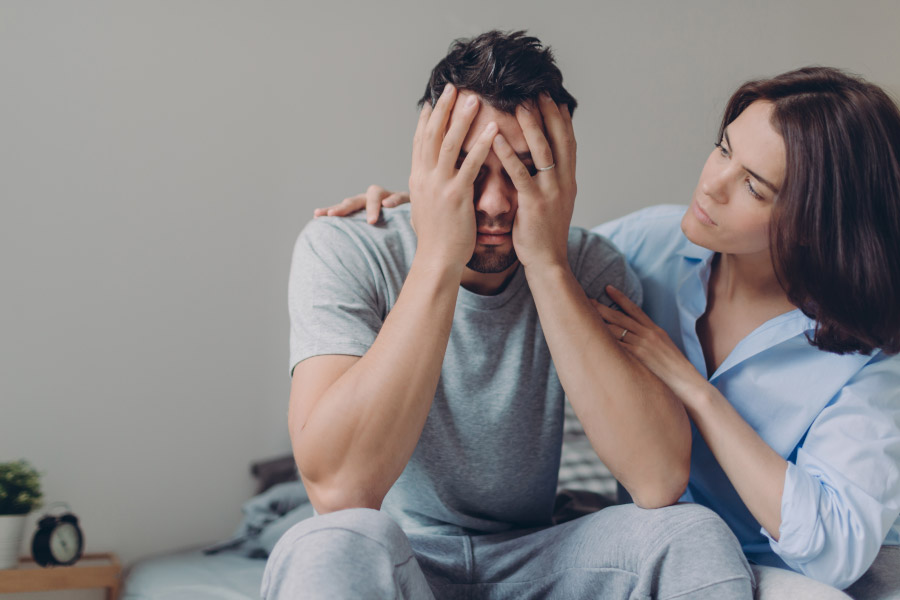Feeling anxious, especially during stressful situations like a tight work schedule, divorce, or losing a loved one, is common. However, persistent anxiety might be due to hormonal imbalances. Testosterone, a key sex hormone, drives libido, bone strength, muscle building, and sperm production. Testosterone levels naturally decrease with age and can fluctuate due to stress, lack of sleep, diet changes, and physical activity. Low levels can result in fatigue, depression, weakness, and low energy . Testosterone Replacement Therapy (TRT) can help alleviate anxiety as well as other symptoms, helping you regain peace.
Should Anxiety be Worrying?
Anxiety is a common mental health disorder. An estimated 19.1% of Americans have dealt with an anxiety disorder just over the past year. Men with anxiety disorders face persistent worry or stress that can make getting through daily activities seemingly impossible. Anxiety disorders include generalized anxiety disorder (GAD), panic disorder, and social anxiety disorder, with symptoms such as:- Persistent sense of worry or dread
- Excessive sweating
- Rapid heartbeat
- Muscle tension
- Irritability
- Insomnia
- Nightmares
- Anger
- Fatigue
How Does Low Testosterone Lead to Anxiety Disorder?
The causes of anxiety are many, including genetics, family history, trauma, lifestyle, and environmental factors. However, studies have also shown a link between low testosterone and anxiety in men. Testosterone replacement can improve mood regulation and reduce irritability. Men produce around 20 times more testosterone than women after puberty, which may explain why fewer men than their female counterparts experience anxiety or depression. Testosterone may protect against anxiety and mood swings. As men age, testosterone levels decline, increasing the risk of hypogonadism and anxiety.What Are the Expected Levels of Testosterone for Males?
Labcorp considers a Free Testosterone range of 7.2-24 pg/mL within normal range. The American Urological Society guideline for normal Total Testosterone levels for men ranges from 300 to 1000 ng/dL, while the Endocrine Society says 264-916. Learn more about the difference between “Free Testosterone” and “Total Testosterone” here. Hypogonadism is marked by testosterone levels below 300 ng/dL, with symptoms like sexual dysfunction, fatigue, and mood changes.Role of Testosterone in Mental Health
Low testosterone levels influence mental health in several ways:- Hinders Serotonin Production: Testosterone helps serotonin secretion from a part of the brain called the dorsal raphe nuclei, enhancing mood. Low serotonin levels can promote anxiety and depression.
- Starts a Vicious Cycle: Chronic stress lowers testosterone levels by disrupting the hypothalamic-pituitary-gonadal axis and increasing cortisol, causing a reduction in testosterone production. This cycle continues as high cortisol levels further reduce testosterone.
- Affects Your Sex Life: Low testosterone, also known as male hypogonadism, can lead to sexual problems like reduced sex drive and erectile dysfunction. Sexual dysfunction can increase the risk of anxiety and depression due to the negative psychological burden it is associated with. TRT can improve sex drive and improve erectile dysfunction.
How Does Low Testosterone Impact Your Mood?
Testosterone helps regulate mood and mental health. Low levels can cause anxiety, depression, and fatigue, negatively impacting the quality of life. Studies show that supplementing testosterone can lower anxiety and improve mood.Know the Typical Signs
Common anxiety symptoms include:- Digestive upset
- Difficulty sleeping
- Excessive sweating
- Overthinking
- Lack of focus
- Irritability
- Shortness of breath
- Fatigue
- Rapid heartbeat
Identifying the Symptoms of Hypogonadism or Low Testosterone
Symptoms of low testosterone include –- Extreme fatigue
- Erectile dysfunction
- Mood swings
- Sudden weight gain
- Decreased muscle strength
- Reduced sexual performance
- Low muscle mass
- Lack of focus
- Low interest in sex

